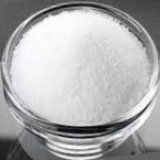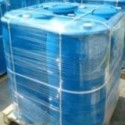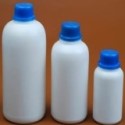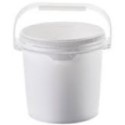 |
Potassium Iodate BP Ph Eur Analytical Reagent FCC Food Grade Supplier Exporter Manufacturers' Representative |
Email: info@ammol.org |
Call Toll Free +1-855-552-6665 |
Potassium Iodate
CAS Number: 7758-05-6
Molecular Formula: KIO3
Molecular Weight: 214

Potassium Iodate
Potassium Iodate is not found in USP Monograph.
Potassium Iodate BP Ph Eur Grade Specifications
KIO3 -- 214.0 -- CAS 7758-05-6
DEFINITION
Potassium Iodate contains not less than 99.0% and not more than 101.0% of KIO3, calculated with reference to the dried substance.
CHARACTERISTICS
A white crystalline powder.
Slowly soluble in water; insoluble in ethanol (96%).
Dissolve 10 g of the substance being examined in sufficient water to produce 200 ml (solution S1).
Add 25 ml of hydrochloric acid to 6 g of the substance being examined, evaporate to dryness and repeat. Heat until iodine is removed. Dissolve the residue in 2.5 ml of a 25% v/v solution of hydrochloric acid and dilute to 50 ml with water (solution S2).
IDENTIFICATION
A. 1 ml of solution S1 yields reaction B characteristic of potassium salts.
B. Dissolve 0.1 g in 5 ml of water. Add 1 ml of silver nitrate solution followed by 1 ml of sulphur dioxide solution. A yellow precipitate is produced immediately.
TESTS
Acidity or alkalinity: pH of solution S1, 5.0 to 8.0.
Clarity and colour of solution: Solution S1 is clear and colourless.
Chloride, chlorate, bromide, bromate: Dilute 5 ml of solution S1 to 15 ml with water, add 20 ml of sulphur dioxide solution and heat on a water bath for 30 minutes. Heat to boiling, cool, add 10 ml of 18M ammonia and 20 ml of silver nitrate solution R2 and dilute to 70 ml with water. Filter, transfer 35 ml of the filtrate to a Nessler cylinder and acidify with 6 ml of nitric acid . After 5 minutes, any opalescence, when viewed vertically, is not greater than that produced by treating 5 ml of a 0.00165% w/v solution of sodium chloride at the same time and in the same manner (0.02%).
Iodide: Add 1 ml of 1.8M sulphuric acid to 25 ml of solution S1 and shake with 1 ml of chloroform. Any violet colour produced is not more intense than that of a solution prepared at the same time and in the same manner but using 5 ml of solution S1 and 2 ml of iodide standard solution (10 ppm I) (20 ppm).
Sulphate: Add 1 ml of a 25% w/v solution of barium chloride to 1.5 ml of sulphate standard solution (10 ppm SO4), shake and allow to stand for 1 minute. Add 12.5 ml of solution S2 diluted to 15 ml with distilled water and 0.5 ml of 5M acetic acid and allow to stand for 5 minutes. Any opalescence produced is not more intense than that of a standard prepared in the same manner but using 7.5 ml of sulphate standard solution (10 ppm SO4) diluted to 15 ml with distilled water in place of the solution being examined (50 ppm).
Heavy metals: Adjust the pH of 20 ml of solution S2 to about 5 with 5M ammonia. The solution complies with limit test A for heavy metals, Appendix VII. Use 10 ml of lead standard solution (2 ppm Pb) to prepare the standard (20 ppm).
Loss on drying: When dried at 130C for 1 hour, loses not more than 0.5% of its weight. Use 1 g.
Potassium Iodate FCC Food Grade Specifications
KIO3 -- Formula weight 214.00
CAS 7758-05-6
DESCRIPTION
Potassium Iodate occurs as a white, crystalline powder. One gram dissolves in about 15 mL of water. It is insoluble in alcohol. The pH of a 1:20 aqueous solution is between 5 and 8.
REQUIREMENTS
Identification: Add 1 drop of starch TS and a few drops of 20% hypophosphorous acid to 1 mL of a 1:10 aqueous solution. A transient blue color appears.
Assay: Not less than 99.0% and not more than 101.0% of KIO3 after drying.
Chlorate: Passes test (limit about 0.01%).
Iodide: Passes test (limit about 0.002%).
Lead: Not more than 4 mg/kg.
Loss on Drying: Not more than 0.5%.
Potassium Iodate Analytical Reagent Grade Specifications
KIO3 -- Formula Wt 214.00 -- CAS Number 7758-05-6
REQUIREMENTS
Assay: 99.4-100.4% KIO3
pH of a 5% solution: 5.0-8.0 at 25C
MAXIMUM ALLOWABLE
Insoluble matter: 0.005%
Chloride and bromide (as Cl): 0.01%
Iodide (I): 0.001%
Nitrogen compounds (as N): 0.005%
Sulfate (SO4): 0.005%
Heavy metals (as Pb): 5 ppm
Iron (Fe): 0.001%
Sodium (Na): 0.005%.
Please visit SDS Safety Data Sheet of Potassium Iodate Suppliers.
American Molecules, also known as ammol.org is a distributor, supplier and manufacturers' representative of all types of Pharmaceuticals, Functional Ingredients, Excipients and Specialty Chemicals in Texas USA. Our principals manufacture supply and export USP NF BP, Ph Eur, etc grades of chemicals pure and reagent grade, mineral fortifiers, FCC food grade. Tailor made particle size and customized specifications are offered. The principal's facility is having one or more of the certifications like FDA approval and GLP, cGMP, ISO9001, ISO14001, ISO/IEC 17025, ISO22000, FSSC 22000, ISO45001, FSSAI, Kosher, HALAL, COPP, WHO-GMP certified and Written Confirmation (WC) for export to Europe is available. The manufacturers suppliers and exporters observe WHO Good Manufacturing Practices and Good Laboratory Practices.





Suppliers and Manufacturers' Representative:

9910 Bent Oak Dr
Houston, TX 77040, USA
Call Toll Free: 1-855-55-AMMOL 1-855-552-6665
Email: info@ammol.org